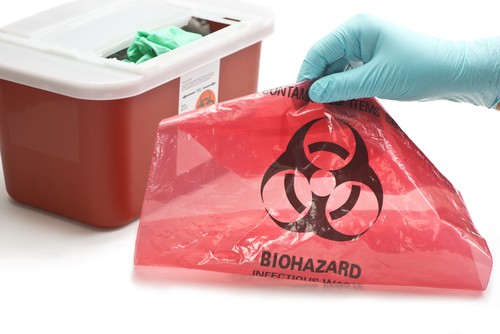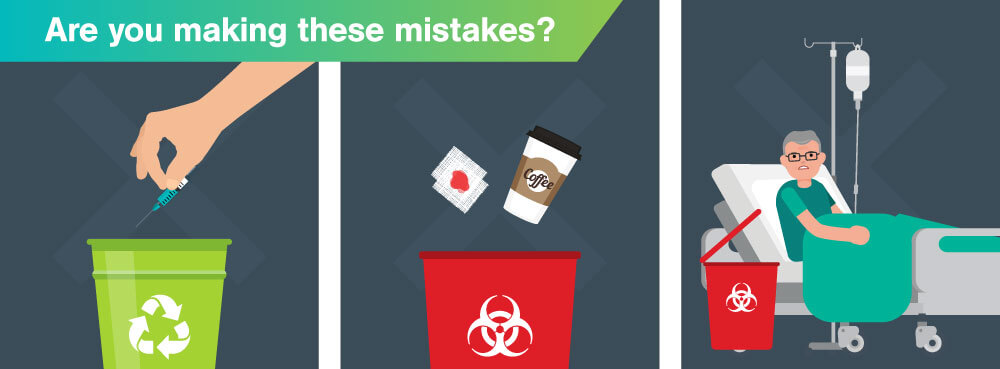Specialist Medical Waste Disposal Service: Protecting Your Center and Neighborhood
Wiki Article
Making Certain Safe Handling and Disposal of Medical Waste
Ensuring risk-free handling and disposal of clinical waste is of extremely important significance in health care setups. Inappropriate management of clinical waste can posture significant risks to the atmosphere, public health and wellness, and healthcare employees. This necessitates adherence to rigorous guidelines and protocols for its safe handling and disposal. In this intro, we will explore the value of correct medical waste monitoring, the dangers connected with incorrect handling and disposal, as well as the standards and techniques that can be implemented to ensure its risk-free disposal. Additionally, we will review the significance of training and education for healthcare experts in order to maintain a safe and clean health care atmosphere. By following these practices, we can properly reduce the potential threats linked with clinical waste.Significance of Correct Clinical Waste Administration
Proper medical waste management is of utmost importance in making sure the security and well-being of medical care specialists, patients, and the general public. Medical waste describes any waste created by healthcare facilities during the diagnosis, treatment, or booster shot of people or animals. This waste can posture significant wellness risks if not taken care of and taken care of correctly.
Among the main reasons that proper clinical waste administration is critical is to avoid the spread of transmittable illness. Medical waste, such as made use of needles, polluted dressings, and organic products, can bring hazardous microorganisms. Otherwise managed and thrown away correctly, these pathogens can be sent to health care workers, individuals, waste handlers, and also the public, bring about the prospective break out of diseases.
Furthermore, appropriate clinical waste monitoring assists safeguard the atmosphere - medical waste removal. Medical waste contains dangerous materials, consisting of chemicals, drugs, and contaminated compounds. When not taken care of appropriately, these materials can pollute soil, water bodies, and the air, presenting a significant threat to ecosystems and public wellness
Furthermore, efficient medical waste administration ensures conformity with international requirements and regional policies. Governments and regulative bodies have actually established protocols and standards to make certain the risk-free handling, storage, transportation, and disposal of clinical waste. Following these regulations is important to prevent legal effects and preserve the reputation and reputation of health care facilities.
Dangers of Improper Handling and Disposal

If medical waste is not appropriately disposed of,Individuals can additionally be exposed to these transmittable conditions. If polluted needles or other sharps are not disposed of in marked puncture-proof containers, they may mistakenly puncture individuals, leading to possible infections. Moreover, if clinical waste is not set apart effectively, there is a danger of cross-contamination between different kinds of waste, additional increasing the chances of disease transmission.
Incorrect disposal of clinical waste can also have destructive impacts on the environment and the public. If medical waste is not treated and dealt with correctly, it can contaminate water sources, dirt, and air, resulting in the spread of illness and pollutants. This can have long-term consequences on environments and public health.
Guidelines for Safe Handling of Medical Waste
Executing effective protocols for the secure handling of medical waste is necessary in guaranteeing the protection of health care experts, individuals, and the general public. These guidelines are crucial in minimizing the dangers linked with the handling and disposal of medical waste, such as infections, injuries, and environmental air pollution.Most importantly, medical care centers need to establish a detailed waste management plan that follows local, nationwide, and international policies. This strategy needs to include clear instructions on waste segregation, packaging, transportation, labeling, and storage space. It is important to divide various types of waste, such as sharps, transmittable materials, drugs, and non-hazardous waste, to stop cross-contamination and promote risk-free disposal.
Furthermore, medical care workers must obtain extensive training on correct waste handling techniques. They must be educated on the prospective hazards of clinical waste, the suitable use individual protective equipment (PPE), and the appropriate procedures for dealing with, transferring, and disposing of different sorts of waste.
Additionally, medical care facilities ought to routinely monitor and examine their waste administration techniques to guarantee conformity with guidelines. This consists of conducting routine inspections, examining waste handling treatments, and giving comments and training to personnel participants.
Reliable Strategies for Waste Disposal
To make certain the secure handling and disposal of clinical waste, it is vital to utilize efficient strategies for waste disposal. Medical waste can present significant dangers to public wellness and the environment if not managed and gotten rid of properly. Healthcare facilities and waste monitoring organizations have to implement proper approaches to minimize these risks.One effective strategy for waste disposal is segregation. It includes dividing various kinds of medical waste based on their features. Partition permits the proper treatment and disposal of each waste group, lowering the capacity for contamination or injury. Healthcare facilities ought to provide clear guidelines and training to employee on exactly how to set apart waste correctly.

Additionally, health care facilities should team up with qualified waste management business to ensure correct disposal of medical waste. These firms have the experience and equipment needed to safely get rid of and handle of clinical waste in conformity with policies and finest techniques.
Training and Education for Medical Care Professionals
Health care professionals this hyperlink play a vital duty in guaranteeing the safe handling and disposal of clinical waste with comprehensive training and education and learning. It is essential for doctor to have a deep understanding of the possible risks linked with clinical waste and the proper procedures for its management. By obtaining proper training, healthcare experts can reduce the possible transmission of infectious illness, protect against environmental contamination, and secure both themselves and the public.
In addition, training programs must stress the use of personal protective tools (PPE) and proper hand hygiene techniques when managing clinical waste. medical waste disposal service. Healthcare specialists must know exactly how to correctly make use of and get rid of of PPE to protect themselves from prospective direct exposure to harmful products. They should likewise be educated on the importance of regular handwashing and the proper usage of hand sanitizers to lessen the spread of transmittable illness
Continuing education and regular updates on medical waste management methods are critical for medical care specialists. As policies and guidelines develop, it is vital to keep medical care service providers informed about any kind of modifications in methods and best methods. This will ensure that they remain current and maintain a high requirement of safety and security in dealing with and getting rid of of medical waste.
Final Thought
In conclusion, proper handling and disposal of medical waste is vital to make certain the safety of healthcare experts, patients, and the environment. Disregarding to adhere to regulations and guidelines can result in numerous dangers and risks. Executing reliable approaches for waste disposal and offering ideal training and education and learning for medical care specialists are important in preserving a risk-free medical care environment. By sticking to these methods, we can minimize the possible threats related to medical waste.Medical waste refers to any waste produced by healthcare facilities during the medical diagnosis, treatment, or booster shot of pets or people. If medical waste is not segregated properly, there is a risk of cross-contamination between different types of waste, additional increasing the possibilities of condition transmission.
It is important to divide various types of waste, such as sharps, transmittable materials, drugs, and non-hazardous waste, to prevent cross-contamination and advertise secure disposal. WasteX Medical Waste Disposal.
To make certain the risk-free handling and disposal of clinical waste, it is crucial to utilize effective approaches for waste disposal. Furthermore, medical care facilities must develop a normal waste collection and transport routine to stop waste buildup and minimize the threat of crashes or contamination.
Report this wiki page